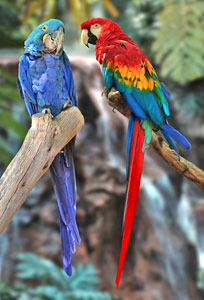
1. Hybrid macaws.
Harlequin macaws are a cross between the Greenwing macaw and the Blue and Gold macaw. The Catalina macaws are a cross between the Blue and Gold and Scarlet macaw. They are beautiful macaws, though “purists” feel that this defeats the purpose of breeding in order to preserve a disappearing species. Hybrids are more expensive than the “ordinary” parrots.
2. On the brink of extinction.
The only macaw species that isn’t endangered in the wild is the Blue and Gold macaw. Naturalists say that the macaws’ dwindling numbers are caused by unregulated exports of birds for the pet trade, the destruction of the rainforests (macaws have been forced to build their nests in low-lying trees, making them vulnerable to predators), and difficulty finding food. For example, the hyacinth macaw needs to eat palm trees, which have also become difficult to find in the wild. No macaws can be legally exported, so all pets have been bred domestically. Of all varieties, the red breasted macaw is the most frequently smuggled.
3. Only eight left!
There are only 7 surviving Spix’s macaws in captivity, and 1 thought to survive in the wild.
4. Are you ready to be the macaw’s mama?
If you are a breeder, by the end of the first month you need to decide if you will hand rear the chicks. If they are hand fed, they will be tamer and easier to train. (If you are selling them, they also command a higher price.) But the process is tedious and requires time and equipment. For example, you will need to invest in an incubator, and provide food once every 2 hours. Ask your veterinarian to demonstrate how to do this, how much food to give, and how to check for overfeeding or underfeeding. This is a very important time in the hatchling’s life and you must be on guard against complications and even death. Eventually the chicks will learn to feed themselves (you will need to crack the seeds for them though.) When they reach this stage, separate them from the parents and begin taming and training.
5. Smart little birds!
Animal behavioralists believe that macaws have the intelligence of a four year old. This means they can learn not only words, but solve puzzles, learn dozens of tricks, and even be taught simple performances.
6. Sounds like…
Macaws get their name from the sounds they make in the wild.